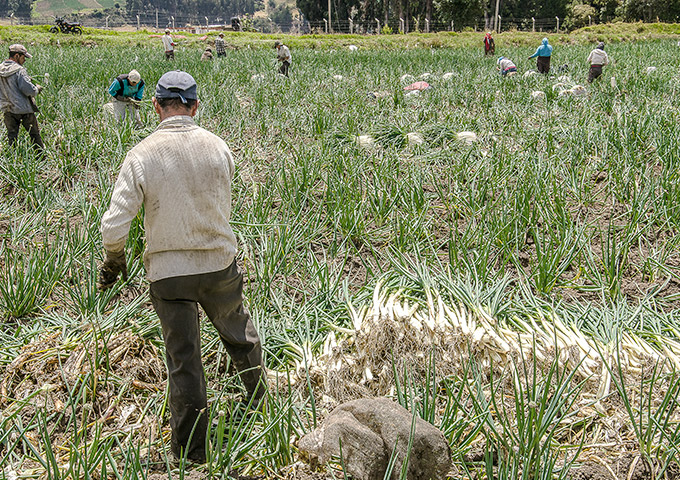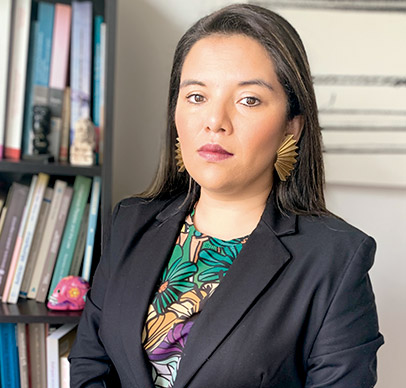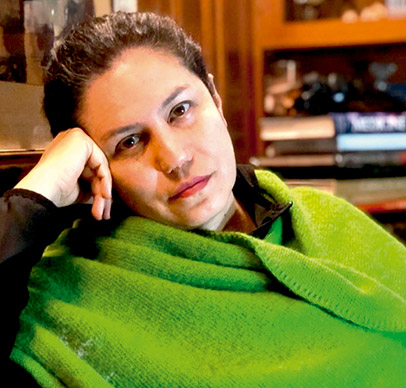Subjects of special protection
By: Tania Valbuena
Photos:
Society and Culture

By: Tania Valbuena
Photos:
In the last few years, the use of the term ‘vulnerable’ has become generalized in social, political, and legal environments. The pandemic has led to an increased use of this term, particularly in media coverage, to refer to groups of older people, medical staff, or low-income populations.However, overusing the term could further affect and stigmatize such groups and not necessarily foster clear and effective humanitarian actions, which would make them true subjects of law.
To understand this problem, specialists from the Human Rights Research Group of the Faculty of Law of the Universidad del Rosario, Diana Rocío Bernal, who has a doctorate in Bioethics and Biolaw, and Andrea Padilla Muñoz, who has a doctorate in Legal Sciences, studied how recognizing subjects of special protection, pursuant to the interpretation of Chapter 13 of the Political Constitution of Colombia (1991), has currently become relevant.
The research titled Subjects of special protection: Building a legal category from the 1991 Colombian Political Constitution shows the importance of building this legal category and places an emphasis on the country’s challenge to guarantee the protection of people whose rights are violated.
“We all can be, in some circumstances, vulnerable and, as a consequence, be subjects of special protection owing to conditions of manifest weakness or to positions of defenselessness depending on the situation”, explained Professors Bernal and Padilla to Advances in Science, emphasizing the State’s need to ensure the compliance of rights of all people at all levels.
Beyond words
Now, with the pandemic, the news shows different uses of the word vulnerable: “More than one thousand vulnerable people were moved yesterday”, “vulnerable families get support from……”, “vulnerable adults, limited to receiving support”, “most vulnerable rural communities”, among other similar uses. However, carelessly interpreted, the term could imply a reference to a quality of the people in question in that these people are the vulnerable ones, when, in fact, it is their rights that are violated by multiple factors or conditions.

Among other ‘vulnerable’ populations, currently, farmers are found. “An adequate quarantine must be guaranteed for farmers to keep complying with their right to food”, says Diana Rocío Bernal, a doctor in Bioethics and Biolaw.
The concept of vulnerable groups has emerged because of international movements to mitigate the impacts caused by racial, religious, or linguistic segregation. In Colombia, it materializes in Article 13 of the Political Constitution.
owever, the Constitutional Court recognized, from verdict T-282 (2008), as “subjects of special protection” those who are in less favorable conditions to effectively exercise their rights owing to historic or cultural reasons.
he study explains that the so-called vulnerabilities are contextual and change in different scenarios. For example, rightsviolations can occur for people in conditions of poverty, subordination, dependency, marginality, territory, and economic scarcity. In addition, this is also true for those who are exposed to limitations because of their physical characteristics (e.g., age and disabilities) as well as victims of violence, such as displaced individuals, refugees, exiles, political leaders, journalists, and inhabitants in areas with public order problems, among others.
Furthermore, there are those who given their ethnicity or race, sexual orientation, nationality, language, religious orientation, or legal situation have been traditionally discriminated against.
Women also belong to this group, including mothers who are the heads of their households and pregnant women
In this sense, Sustainable Development Goals (SDG) offer a series of variables that would, if fulfilled by governments, benefit and favor individuals’ fundamental rights

Andrea Padilla Muñoz, a doctor in Legal Sciences, affirms that “today, in the pandemic, the medical staff becomes the population that must be protected because it is exposed to situations that make their rights vulnerable”.
“It is important to highlight that neither rights nor subjects are a limited list but that they are understood under the premise of the social, historical, and political circumstances, among others, that the country goes through,”, the study concludes.
Thus, taking human rights’ international law and recognizing cultural pluralism as a reference, those legally considered subjects of special protection deserve to have their universal rights acknowledged with a differential approach.
he relevant reading is considerably important, points out Padilla: “Today, in the pandemic, the medical staff becomes the population we must protect because they are exposed to situations that make their rights vulnerable”. Currently, among other ‘vulnerables’ populations, farmers are found. “An adequate quarantine must be guaranteed also for farmers and keep complying with their right to food”, observed Bernal.
In its conclusions, the study noted that the greatest challenge is the parallel work of the Legislative and Executive Power to take measures that guarantee the Court’s caselaw line.
“The country must guarantee the recognition of these people from the differential approach and, thus, be able to articulate social policies, in terms of goals and results, among the different programs, environments, and institutions”
Bernal and Padilla highlighted the following:“We must be watchful and look for protection mechanisms if our rights are being violated; at a personal level, we must also be more supportive, empathetic, and compassionate to break the vicious circles that generate a violation of fundamental rights”.